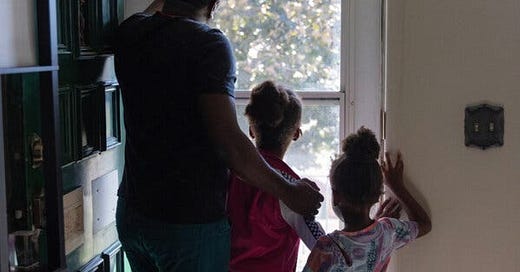Many Haitians Prospered in Springfield. For example, a young family came to love the city where they rebuilt their lives and bought a home. Since a false rumor spread, they have scrapped outings, even to the park.
Although many Haitians now consider Springfield, Ohio, home, some are wondering whether they should uproot their families. After fleeing political corruption and violent intimidation in Haiti, some Haitians felt cocooned in the safety of the small Ohio city where they arrived in 2021 and rebuilt their lives.
People had steady jobs. Their young daughters were thriving. On weekends, families visited nearby Buck Creek State Park. They moved into what they thought would be their forever home. “We were very comfortable here, thinking Springfield is our place,” Mr. Delva said in an interview, almost two years to the day since receiving the keys to a cream-colored, three-bedroom house.
It has been a month since former President Donald J. Trump and his running mate, JD Vance, injected Springfield into the election by spreading baseless rumors about Haitians abducting and eating pets. But many immigrants are still shaken, reordering their daily routines and reconsidering whether to stay where they feel unwanted and unsafe.
Then members of hate groups have descended on Springfield several times in the last month. One group unfurled a huge banner outside city hall inscribed with “Haitians Have No Home Here” in English and in Haitian Creole. Ku Klux Klan fliers have popped up around town. A neo-Nazi group waved swastikas in front of the home of the mayor.
Most of the newly arrived Haitians are in the country legally, many of them granted what is known as “Temporary Protected Status” because of the widespread violence and instability in their homeland Haiti. Now Mr. Trump says that he would change that status and deport them back to Haiti. And in the streets and stores, strangers have hurled insults at Haitians. The tires on their cars have been slashed overnight. Some shoppers have meowed at Haitians in supermarket aisles, according to Haitians, community leaders and immigrant advocates.
Now Haitians have no choice but to take precautions. Gone are the afternoons at the park for his girls, ages 10, 5 and 2, one man said to reporters. “Everybody is staying inside,” a man said, except to go to school, commute to work or shop for groceries.
Thousands of Haitians have arrived in Springfield in the last few years. They have filled jobs in manufacturing, distribution and the service sector that were available after the city created a revitalization plan that attracted new businesses to the area.
Haitians are not the first newcomers to face hostility in Springfield. In the early 20th century, the city drew poor southerners, white and Black, to work in factories. In 1904, a Black man was lynched and a Black neighborhood was set ablaze. Members of the Ku Klux Klan paraded through the streets. White migrants were derided as backward people with “undesirable qualities of the new immigrant,” Max Fraser, a labor scholar, wrote in “Hillbilly Highway,” his history of Appalachian migration.
In the 1990s, Hispanics began arriving in Springfield and they, too, faced discrimination, said Jason Barlow, a representative in Ohio for United Automobile Workers, whose grandfather migrated to Springfield from Alabama in the 1940s. “It’s not the first time we see this animosity, unfortunately.”
But the Haitians have been settling in Springfield at a moment when immigration has become one of the most contentious issues in the country, fueled by Mr. Trump, who has vilified immigrants and promised mass deportations if he returns to the White House. The influx of newcomers had strained government services in Springfield and had been fueling anxiety and tensions in the city, even before Mr. Trump. In the days that followed Trumps announcements, Springfield faced a wave of bomb threats and Haitians encountered growing hostility from inside and outside the city.
“I haven’t seen hate rise to this level in my lifetime,” said Mr. Barlow, 50, who grew up in Springfield. Mr. Trump and Mr. Vance have dismissed the outcry over the comments and instead have redoubled their attacks on Haitians in the United States.





